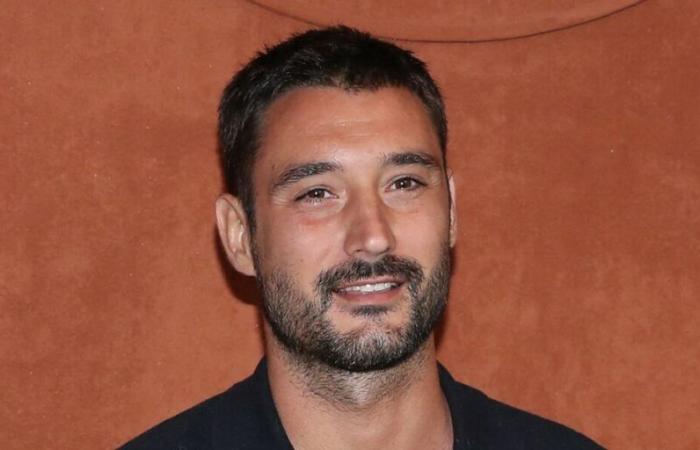“Farewell, we say goodbye. Two defeated lovers. Let’s not talk about the past anymore.“Unless you have spent the last few months in orbit, you have most likely heard these words, taken from the song Adieu by Jérémy Frérot. A single where the 34-year-old artist sings about his breakup with Laure Manaudou, taken from his third album, Sand Kidreleased on Friday September 13, 2024. Ten years after his participation in The Voice with Flo Delavega, the singer, who is now a single father, confirms all the good things that we already thought of him with this new opus. On this occasion, Jérémy Frérot spoke to Tele-Leisure for an exclusive interview.
Tele-Leisure : Your new album marks your return after a two-year musical break. Why this distance?
Jérémy Frérot: I needed it because I had made my previous record during Covid, at home. It’s been a pretty weird pace. I gave a lot of energy and after all the life of this second album, I needed to stop, to settle down, to rebuild myself because I no longer had any ideas at all. I needed to refocus on the essentials: on the place where I live – the Arcachon basin – my family, my friends. To fill my head with new ideas, to live in fact! That’s what happened and it worked out well for me because I found the inspiration to write a whole album.
Why did you choose the song? Adieu as the first extract?
Because that was the song that kind of started all the others. I was in the studio, but I was disturbed, a little lost. I had just experienced an intense emotional change in my personal life and I started writing about it. It came out very naturally. I wrote down what my children were told by their mother to tell them that we were going to change our lives. I sang it that same evening and I got a little sick at that time because I had it inside me, in my stomach, and getting it out was quite violent. It was difficult, but after that song, all the others came out at once. To go out Adieu as the first single was quite logical because it shows in what state I started my album and in what state I wrote everything else. I think it’s a great introduction.
“It’s a bit complicated to release a song like Adieu because there are a lot of questions”
The connection with your personal life is obvious. Did you talk about it with your ex-partner, Laure Manaudou, before making it the first extract from the album?
Of course ! There are always discussions. If I released it, it was because it was possible. Afterwards, it’s a song that really talks about what I feel, what I’ve been through on my own, how to manage separation with children of that age. It is my vision of things that I present. Obviously, it’s a bit complicated to release a song like that because there are a lot of questions. But questioning is important in the life of an artist. If you don’t ask yourself questions and are sure of yourself, you can very quickly stumble and that’s not good. We must have doubts and not hesitate to ask the people around us for their opinion.
How do you experience the attention paid to your private life?
I live it very well because I give what I want to give. Everything I say is because I chose it. It’s me who directs the information, it’s not the people who draw. I share what I want to share and the rest I keep to myself. In addition, I only give what inspires me.
About the song Sand kidsyou said on Instagram that you loved the nostalgia of this title. Isn’t 34 a little young to be nostalgic?
Do you believe? [Il rit] I don’t think so! I was nostalgic very early. I belong to a generation where parents still made photo albums and, when I still lived with my parents, to avoid doing my homework, I consulted them. I was 17/18 years old and I was already nostalgic. Nostalgia has held me for all this time and I love it a lot, nostalgia, because it reminds me of the state I was in, the emotions I had. When I remember it, I get it all back. Nostalgia is a kind of kit of all these feelings from which I can draw to compose and write. It helps me a lot. Furthermore, the two years that I spent in the Arcachon basin with my children could only make me nostalgic because I saw them evolve in the places where I evolved at their age. It brought tears to my eyes when I saw them playing games where I was playing.
In the song Third albumyou address the audience directly. Is this important to you?
A lot. For me, the third album is something quite important in the life of an artist. In this song, there’s a bit of Fréro Delavega because we didn’t manage to make a third album, which I really wanted. So it’s a small victory for me to arrive at this third solo album. I address the audience by saying: “That’s it, I made it, we made it! You helped me and here we are, we are together on this third album“.
In the song Zeroyou say: “7 billion chairs, where do you belong?“Are you still asking yourself the question or do you feel like you’ve found your place?
I try to find it every day. Every day we change, we are not the same human we were yesterday. I have the impression that we must constantly find it. So, since I had children, there is a chair that has become a staple, on which I sit every time I have them with me. But when I’m Jérémy Frérot, the artist who travels all over France to see people, I’m in a different chair. I tell myself that maybe we have several chairs, but it’s not so bad after all! I think if I always sat in the same chair I would get bored at some point.
Jérémy Frérot coach on The Voice? : “I didn’t feel at all legitimate to be able to give advice”
In the same song you also say: “Have you ever thought about dying at 30, imagine the speeches at your funeral“. Have you already thought about what you would like people to say about you when that happens, as soon as possible I hope?
Merci [Il rit]. In fact, I think about it every time I do something. I tell myself that I have to try to do things as best as possible to leave a beautiful enough mark. On the other hand, I don’t wonder what people will say, it’s up to them. But I often ask if I die today, who will be there?
You sing a duet with the rapper Kemmler. Is this a musical genre that you like?
Of course ! In college, I listened to NTM and IAM. I learned the lyrics by heart. I moved away from it a little when I went to college. I started listening to a lot of acoustic music. But I got back into it when I moved to Marseille about ten years ago. I really like the play on words. I can be very moved by a rap song.
You will be on tour until at least the end of 2025. Is life on the road something you enjoy?
That’s why I do this job and why I release albums. I like life in the studio a little less but you have to go through it to get new songs and go on tour. What I like is seeing people’s faces when I sing, seeing the emotion in their eyes. I also really like life on tour because it’s a colony life, on a bus. I like everyone to feel important, and everyone does. If someone feels bad, we carry them, we comfort them so that each piece of the puzzle fits together well so that in the evening, we all play together.
Isn’t it too complicated to reconcile life on tour and life as a solo dad?
I’ve never done it yet. Until now, I have always been on tour with the mother of my children to help me. This will be a first and it’s an organization that will go very well. Everyone has their own job, but everyone will help each other to make the children feel as good as possible.
Jérémy Frérot: “I was even banned from banking”
You were revealed by the show The Voice. Could we see you coach someday at The Voice or The Voice Kids like Claudio Capeo with whom you share a duet on this album?
I have often been asked this question and for a long time I answered no because I did not feel at all legitimate to be able to give advice. But recently, I have reconsidered my judgment and now, listening to artists, telling them what I feel and perhaps helping some of them, I would really enjoy. Child or adult, it certainly wouldn’t be the same thing, but just the idea of being able to discuss artistically with singers and see how we can do to bring them into their world as best as possible, that’s something that pleases me! In fact, during my two year break, I took stock of everything that had happened during these fifteen years of music and it allowed me to realize that I felt legitimate today. .
The title of your album, Gamin of the sandsis obviously a reference to your native region and heart, Gironde. Have you ever been tempted to settle in Paris, especially for work?
But I did it! When, with Flo Delavega, we signed with a record label, I moved to Paris and it was very, very hard for me to leave the Arcachon basin, which I had never done. I fell into depression in the first months because I no longer felt the sea and I was far from the sea. I was still a student so every week, I paid for a train ticket to go home on Friday. Because of doing this, I was even banned from banking. [Il rit] I lived for four years in Paris, then four years in Marseille, before returning to the Arcachon basin five years ago. Afterwards, it’s just a question of organization: I can leave in the morning, dress my children, put the snack in the schoolbag, take the train, promote in Paris and come back in the evening.
We’ve never seen you in a series or a film. Could comedy tempt you?
Yes, completely! In fact, it’s an exercise that you do every day when you’re an artist. We act a bit, and especially on stage, because if I were the same person on stage and in life, it would be really very weird. People would think I was crazy. [Il rit] I don’t know if I could do it, I don’t have that pretension at all, but I would like to try.
In your previous album, you asked yourself “What is a man?”. Do you have an answer today?
I think it’s okay not to be able to answer this question precisely. Since I asked myself this question, I have seen that morals and trends are changing. A man today can be strong, or sensitive, or say he doesn’t know. There are lots of different ways to be and that’s beautiful!






